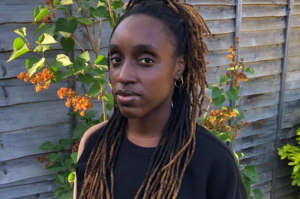
One of the best things about literature is its ability to transport you into a world removed from your own. But what’s probably even better is when you, as a reader, get to dwell in that world over the course of not one, but three, books. Here, we’re listing eight trilogies by African writers that we guarantee will lure you so completely into their world, you’ll forget you’re in the midst of a global pandemic.
1. Chinua Achebe’s African Trilogy
Things Fall Apart (1958), No Longer at Ease (1960), Arrow of God (1964)

So of course you’ve read Things Fall Apart (if you haven’t, #smdh). But have you read the other two novels that make up Achebe’s African Trilogy? If you haven’t, now’s the time to start. Although Arrow of God was published after No Longer at Ease, the novel in fact precedes it temporally in the structure of the trilogy; it continues where Things Fall Apart left off, with the plot revolving around Ezeulu, a priest who finds his authority increasingly under threat from his rivals, British colonial rule, and Christian missionaries. No Longer at Ease follows the story of Obi Okonkwo, the grandson of Okonkwo whom we met in Things Fall Apart, as he returns from university in England and clashes with the ruling elite in Nigeria. With each novel, Achebe masterfully captures various aspects and effects of colonial rule to offer a picture of a rapidly evolving society.
2. Naguib Mahfouz’s Cairo Trilogy
Palace Walk (1956), Palace of Desire (1957), Sugar Street (1957)

Okay, maybe you have read Achebe’s African Trilogy. But perhaps you haven’t read Nobel Prize-winning author Naguib Mahfouz’s Cairo Trilogy. The novels, in a word, follow the lives of a Cairo merchant Ahmad ‘Abd al-Jawad, his children, and his grandchildren as against the backdrop of the tumultuous sociopolitical changes in Egypt from the Egyptian revolt against the British in 1919 until approximately the end of World War II in 1944. The trilogy is at once a family saga and a history of middle-class Egyptian life during that period; we learn about daily rituals as much as the main political trends of the time, which are represented by family members. Here’s a fun fact: the Arabic titles of the novels are actual street names in Cairo.
3. Nuruddin Farah’s Blood in the Sun Trilogy
Maps (1986), Gifts (1993), Secrets (1998)

Actually, Farah has written three trilogies; in addition to the Blood in the Sun trilogy, he’s also written the Variations on the Theme of Dictatorship trilogy — Sweet and Sour Milk (1979), Sardines (1981), and Close Sesame (1983) — as well as the Past Imperfect trilogy — Links (2003), Knots (2007), and Crossbones (2011). Talk about a bumper crop. But we’re focusing here on the Blood in the Sun trilogy, perhaps his best known. Maps recounts the story of Askar, an orphan who, when he heads off to Mogadishu to study, becomes involved in radical political activity. Gifts, even as its main plot revolves around a foundling infant, casts a critical eye at Western relief agencies that swamp Somalia with their aid. And Secrets follows the attempt of Kalaman to figure out his origins in the midst of Somalia’s civil war. Across all three novels, Farah’s prose and inventiveness captivate.
4. Tsitsi Dangarembga’s Tambudzai and Nyasha Trilogy
Nervous Conditions (1988), The Book of Not (2006), and This Mournable Body (2018)

When Nervous Conditions was published, it brought a fresh and much-needed female perspective to the challenges posed by a patriarchal society and the legacies of colonialism. Dangarembga continues her exploration of the psyche and conditions of women’s lives in The Book of Not and This Mournable Body. The novels follow Tambudzai, whom we meet as a student at a missionary school in Nervous Conditions, across the continuation of her studies at a convent boarding school and, subsequently, her failed attempts to find a job in Harare. In spite of the trilogy’s seemingly pessimistic overtones, it shows us the infinite capacity of female friendship through Tambudzai’s relationship with Nyasha, which evolves as these characters themselves evolve.
5. Ben Okri’s The Famished Road Trilogy
The Famished Road (1991), Songs of Enchantment (1993), and Infinite Riches (1998)

Okri burst onto the global literary scene when he won the Booker Prize with The Famished Road. Songs of Enchantment and Infinite Riches continues the story of Azaro, an abiku (“spirit child”) who moves between the spirit and everyday worlds, and his family’s attempts to gain sure footing in the midst of political chaos. Whereas The Famished Road is mainly concerned with Azaro’s struggle to stay in our world, Songs of Enchantment revolves around the efforts of Azaro’s father to save his mother from a bewitchment, and Infinite Riches follows the efforts of Azaro’s mother to find justice for Azaro’s father, who has been wrongfully accused of a murder. Throughout the trilogy, Okri sustains his signature weaving of prose that moves in and out of reality with political themes.
6. Nnedi Okorafor’s Binti Trilogy
Binti (2015), Binti: Home (2017), Binti: The Night Masquerade (2018)

If Ben Okri’s kind of “otherworldly” isn’t your cup of tea, try instead Nnedi Okorafor’s multiple-award winning Binti trilogy, which takes you literally out of this world into a universe where malicious, murderous jellyfish-like alien roam and you can hop onto a ship bound for an intergalactic university. The series follows the titular character, Binti, on her journey to the aforementioned university, her return home and ensuing friction with her family, and her attempts to prevent the outbreak of war between her people, a dominant ethnic group, and said jellyfish-like creatures. You’ll come to fall in love with Binti, whose journey of learning and un-learning lie at the heart of the trilogy’s plot twists and turns.
7. Tade Thompson’s Wormwood Trilogy
Rosewater (2016); The Rosewater Insurrection (2019); The Rosewater Redemption (2019)

For those whose appetite for science fiction was whetted by Okorafor’s novels, Tade Thompson’s Wormwood trilogy will be right up your alley. The first novel introduces us to Rosewater, a city set in mid-2060s Nigeria that emerged after a gigantic alien lifeform dubbed Wormwood crashed into Earth, and Kaaro, a “sensitive” who has the power to access people’s emotions, thoughts, and memories. The second novel reveals the purpose of Wormwood’s actions (no spoilers here), and the third recounts Kaaro’s attempts to get rid of the aliens. Even as the trilogy can be read as an allegory of colonialism (hello, alien invasion) and a sensitive reflection on the hazards and potency of hyper-connectivity, Thompson’s trilogy is at its core a page-turner that will keep you on the edge of your seat.
8. Wole Soyinka’s trio of place-based memoirs
Aké: The Years of Childhood (1981); Isara: A Voyage Around “Essay” (1989); Ibadan: The Penkelemes Years, A Memoir 1946-1965 (1994)

Wole Soyinka has in fact written two other memoirs — The Man Died: Prison Notes (1972) and You Must Set Forth at Dawn (2006) — but we’re grouping here as a trio his memoirs that are named after particular places meaningful to Soyinka’s life. As its title suggests, Aké: The Years of Childhood recounts Soyinka’s childhood in Aké, where he spent twelve years of his early life. The title of the second is somewhat more elliptical. Whereas Isara is where Soyinka’s ancestral roots are located, “Essay” is in fact the moniker Soyinka’s father was bestowed with by his students, and given that Soyinka borrowed the subtitle of this memoir from the John Mortimer play A Voyage Round My Father, Isara: A Voyage Around “Essay” is indeed a book that reconstructs the life and times of Soyinka’s dad in 1930s Nigeria, when the British were still in power. The third memoir follows “Maren,” Soyinka’s alter-ego, from his secondary school days at Ibadan to his college experience at the University of Leeds and finally his stint as a research fellow at the University of Ibadan — all the while providing us with insight into Soyinka’s growing political consciousness. Although they’re called memoirs, these books are really more a blend of fact with fiction, and above all, a testimony to Soyinka’s fantastic story-telling skills.
BONUS
Kwei Quartey’s Darko Dawson Mysteries
Wife of the Gods (2009); Children of the Street (2011); Murder at Cape Three Points (2014); Gold of Our Fathers (2014); Death by His Grace (2017)

Why is it that, within the category of so-called genre fiction, science fiction and fantasy novels usually come as trilogies, but detective or mystery novels usually extend beyond three novels? We have no idea, but that doesn’t stop us from highly recommending Kwei Quartey’s Darko Dawson police procedurals. Each of Quartey’s novels follow detective inspector Darko Dawson on murder investigations across Ghana that range from the death of a young medical student, to a number of children, to a wealthy couple, to a Chinese mine owner, and most recently, to a high-society bride. These novels are definitely for the mystery lover, but you get a good dose of insight into Ghanian life and culture too.









ANDREW WATUHA April 30, 2020 17:37
WONDERFUL!